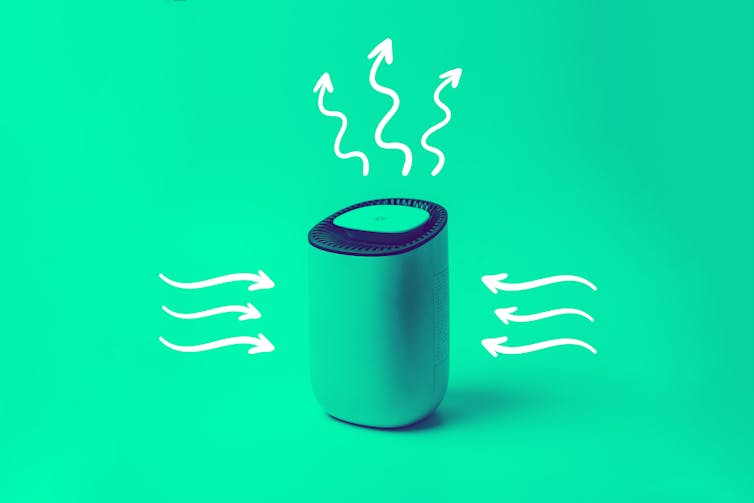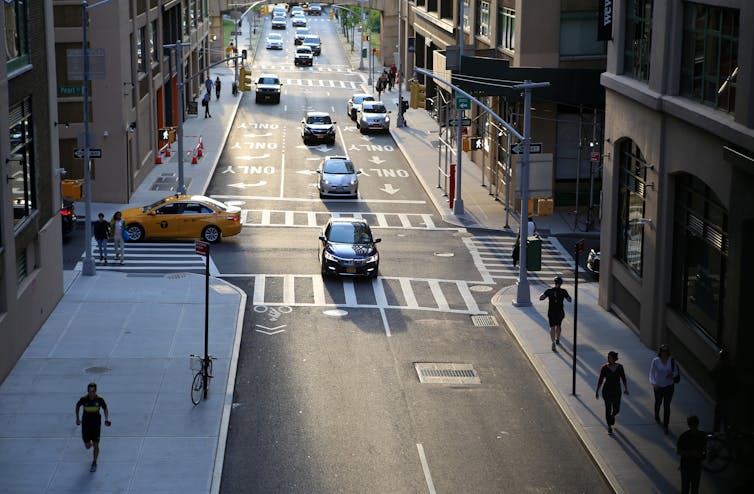Air filters can scrub out pollutants near highways, reduce blood pressure
- Written by Doug Brugge, Professor and Chair of Public Health Science and Community Medicine, University of Connecticut
The Research Brief[1] is a short take about interesting academic work.
The big idea
For people living near busy highways, using air filters indoors results in short-term improvements to blood pressure[2], according to a new study I co-authored[3].
Next to busy highways and major roadways, there are high concentrations of air pollution[4] – including exceptionally tiny, invisible and odorless ultrafine particles from burning fuel. My colleagues Neelakshi Hudda[5], Misha Eliasziw[6] and I tested how using air filters indoors near a highway can reduce exposure to ultrafine and other particulate pollutants – and what effect that has on blood pressure.
Our team tested 77 participants over three two-hour sessions in a room next to a busy highway. We manipulated the level of air pollution in the room using portable air filters, windows and doors to create low, medium and high exposures to ultrafine and other particles. We measured the blood pressure of study participants every 10 minutes.
Our study found that blood pressure is dose-dependent on exposure to ultrafine particles – the higher the levels of pollution, the higher a person’s blood pressure. Importantly, we also found that air filters can effectively reduce this pollution and reduce the associated blood pressure increases.
The difference in blood pressure between high and low exposures was relatively small, below 3 mm of mercury. However, even this small change could affect risk of heart attacks and strokes[7] if sustained over periods longer than our two-hour sessions.
 Air filters can remove ultrafine particles that increase blood pressure.
Anass Bachar/EyeEm via Getty Images[8]
Air filters can remove ultrafine particles that increase blood pressure.
Anass Bachar/EyeEm via Getty Images[8]
Why it matters
A lot of research has linked living close to heavily trafficked roadways[9] with adverse health outcomes[10]. Researchers also know that particulate air pollution affects cardiovascular health[11], but most work has focused on larger particles, called PM2.5.
My colleagues and I are contributing to the Community Assessment of Freeway Exposure and Health[12], which focuses on much smaller ultrafine particles. There is currently no regulation regarding emissions of ultrafine particles, and they have not been studied in as much detail as PM2.5. Our work and other studies have found that they are associated with biomarkers of increased inflammation[13] and increased blood pressure[14].
Motor vehicles will continue to emit pollution for a long time. Since the source of these pollutants isn’t going away anytime soon, I think one good way to try to improve the health of people living near busy roads is by cleaning the air in their houses[15]. Our study suggests that air filters can do this in a way that meaningfully lowers blood pressure.
 Air filters lower blood pressure in the confines of a home, but it is unknown if this effect holds over time.
Busà Photography/Moment via Getty Images[16]
Air filters lower blood pressure in the confines of a home, but it is unknown if this effect holds over time.
Busà Photography/Moment via Getty Images[16]
What isn’t known
This work is promising, but the tightly controlled setting of the study might not translate into benefits for people going about their daily lives.
For people who stay home and have their windows closed most of the time, it seems likely that air filters would have a beneficial reduction in their blood pressure similar to what we saw in our study. But many people leave their homes for extended periods for work or school. Whether there will be enough reduction in blood pressure to result in health benefits in these cases remains to be seen.
What’s next
My colleagues and I are currently enrolling participants for a new study exploring whether there are benefits from placing air filters in people’s homes in real–life scenarios.
The participants in this new study will receive both real and sham air filters and alternate using them for one month at a time each. Our team will measure the participants’ blood pressure at the start and end of each month and then compare the same person’s blood pressure from month to month to see if the air filters really lower blood pressure. The results of this study should help us determine whether air filters can produce long-term reductions in blood pressure for those living near highways.
References
- ^ Research Brief (theconversation.com)
- ^ short-term improvements to blood pressure (doi.org)
- ^ I co-authored (scholar.google.co.uk)
- ^ high concentrations of air pollution (doi.org)
- ^ Neelakshi Hudda (scholar.google.com)
- ^ Misha Eliasziw (publichealth.tufts.edu)
- ^ small change could affect risk of heart attacks and strokes (doi.org)
- ^ Anass Bachar/EyeEm via Getty Images (www.gettyimages.com)
- ^ close to heavily trafficked roadways (www.doi.org)
- ^ adverse health outcomes (www.healtheffects.org)
- ^ particulate air pollution affects cardiovascular health (doi.org)
- ^ Community Assessment of Freeway Exposure and Health (cafeh.squarespace.com)
- ^ with biomarkers of increased inflammation (doi.org)
- ^ increased blood pressure (dx.doi.org)
- ^ cleaning the air in their houses (ww2.arb.ca.gov)
- ^ Busà Photography/Moment via Getty Images (www.gettyimages.com)
Authors: Doug Brugge, Professor and Chair of Public Health Science and Community Medicine, University of Connecticut

